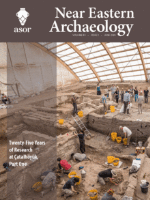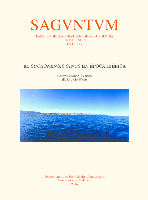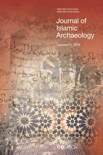
Archaeologia Baltica
metrics 2024
Where Baltic Archaeology Meets Scholarly Excellence
Introduction
Archaeologia Baltica, published by the Institute of Baltic Region History & Archaeology at Klaipeda University, stands as a premier platform in the field of archaeology, with a specific focus on the Baltic region. This esteemed journal, which boasts a Q1 ranking in both the Arts and Humanities and Archaeology categories as of 2023, serves as a critical resource for scholars, researchers, and students dedicated to the exploration of archaeological horizons. Featuring an array of original research articles, reviews, and theoretical discussions, it aims to advance knowledge and foster dialogue in the diverse fields of archaeology. Though currently not an open-access publication, Archaeologia Baltica enjoys a commendable position in the Scopus rankings, underscoring its importance in shaping contemporary archaeological discourse. The journal not only reflects rigorous academic standards but also invites contributions that encourage collaborative efforts in the study of our shared cultural heritage.
Metrics 2024
 0.48
0.48 0.60
0.60 -
- 7
7Metrics History
Rank 2024
Scopus
JCI (Web Of Science)
Quartile History
Similar Journals

Lucentum
Empowering Scholars, Enriching MindsLucentum is a distinguished open-access journal published by Universidad de Alicante, focusing on the interdisciplinary fields of Archeology, History, and Paleontology. Since its inception in 1982, it has established itself as a vital platform for scholars and researchers to disseminate their findings, contributing significantly to the academic landscape in Spain and beyond. The journal's notable rankings, including Q1 status in History and Q2 in Archeology, reflect its commitment to high-quality scholarship and rigorous peer review. With an impressive impact factor and recognition in Scopus, Lucentum serves as an essential resource for professionals, students, and historians, fostering a deeper understanding of cultural and historical contexts through a wealth of interdisciplinary research. The journal continues to embrace open access, ensuring that critical knowledge is freely available to the global research community.

NEAR EASTERN ARCHAEOLOGY
Uncovering the Past, Shaping the FutureNEAR EASTERN ARCHAEOLOGY, published by University of Chicago Press, is a premier journal dedicated to the field of archaeology, particularly focusing on the rich cultural heritage and archaeological findings of the Near East. With an ISSN of 1094-2076 and an E-ISSN of 2325-5404, this esteemed publication provides a vital platform for scholars and practitioners to share their research, insights, and discoveries. The journal holds an impressive ranking in the Q1 quartile for both Archaeology and History in 2023, reflecting its significant impact within these fields and a robust history of scholarly contribution. The journal has been pivotal in shaping discussions around archaeological methodology, theory, and contemporary issues from 2002 to 2024, as it continues to reach a wide audience through various access options. With Scopus rankings placing it in the top percentiles for both History and Archaeology, NEAR EASTERN ARCHAEOLOGY represents an essential resource for researchers, professionals, and students alike, fostering the exploration and understanding of the region's archaeological narrative.

Interdisciplinaria Archaeologica-Natural Sciences in Archaeology
Bridging Disciplines, Unveiling the PastInterdisciplinaria Archaeologica-Natural Sciences in Archaeology is a distinguished journal published by UNIV HRADEC KRALOVE, dedicated to the exploration and integration of natural sciences within the context of archaeology. With an impact factor that reflects its strong footing in the academic community, this journal provides a vital platform for interdisciplinary research, fostering collaboration among archaeologists, scientists, and scholars from diverse fields. Since its transition to Open Access in 2010, it has made significant contributions to the accessibility of research findings, connecting global audiences interested in the archaeological sciences. Based in the Czech Republic, the journal has achieved impressive rankings—placing in the Q2 quartile across both Archaeology and Arts and Humanities categories, as well as respectable standings in the Social Sciences domain. Over its converged years from 2014 to 2024, it has published cutting-edge studies that enhance our understanding of past human behaviors through scientific methodologies. Researchers, professionals, and students are encouraged to engage with the journal’s content to contribute to and benefit from the vibrant discourse in archaeological science.

Lanx-Journal of the Scuola di Specializzazione in Archeologia of the University of Milan
Exploring cultural heritage through innovative research.Lanx-Journal of the Scuola di Specializzazione in Archeologia of the University of Milan, published by Milano University Press, is a distinguished platform dedicated to the field of archaeology. Committed to advancing archaeological research and scholarship, this Open Access journal has been available to the global academic community since 2008, facilitating easy dissemination of innovative ideas and findings. With a strong emphasis on promoting interdisciplinary dialogue, the journal covers a wide range of topics from classical archaeology to contemporary practices, making it an invaluable resource for researchers, professionals, and students in the field. Situated in the historic city of Milan, it aims to contribute to the preservation and understanding of cultural heritage through rigorous academic inquiry and collaboration.

Baltica
Illuminating the Path of Geological Discovery.Baltica is a distinguished journal housed under the Institute of Geology and Geography in Lithuania, focusing on the diverse realms of Earth and Planetary Sciences. Established in the mid-1990s, with a publication history dating back to 1994, the journal has continually sought to advance scholarly communication and innovation within the field. Although presently categorized in the Q4 quartile of Earth and Planetary Sciences, its contributions remain vital for researchers, professionals, and students interested in interdisciplinary approaches to understanding our planet’s dynamics. With an ISSN of 0067-3064 and an E-ISSN of 1648-858X, Baltica disseminates valuable findings and discussions that appeal to a broad academic audience, encouraging critical thinking and knowledge exchange. While the journal lacks Open Access options, it nonetheless serves as a significant platform for emerging and established scholars alike, facilitating a deeper engagement with critical geographical and geological research.

Cuadernos de Prehistoria y Arqueologia-Universidad Autonoma de Madrid
Uncovering the Past, Shaping the FutureCuadernos de Prehistoria y Arqueologia-Universidad Autonoma de Madrid is a distinguished academic journal dedicated to the fields of archaeology and prehistory, published by the Universidad Autonoma de Madrid, Departamento de Prehistoria y Arqueología. With an ISSN of 0211-1608, this journal plays a crucial role in disseminating significant research findings and theoretical advancements within these domains. Recognized for its scholarly excellence, it holds impressive quartile rankings in 2023, including Q2 in Archaeology and Q1 in History, reflecting its high impact within the academic community. While currently not an open-access publication, Cuadernos de Prehistoria y Arqueologia provides valuable insights to researchers, professionals, and students engaged in the exploration of human history and cultural heritage from 2018 to 2024 and beyond. With a commitment to fostering interdisciplinary dialogue, this journal serves as an essential platform for innovative studies and comprehensive reviews, contributing to the advancement of knowledge in archaeology and prehistory.

SAGVNTVM-Papeles del Laboratorio de Arqueologia de Valencia
Connecting Scholars and Ideas in the Field of Archaeology.SAGVNTVM-Papeles del Laboratorio de Arqueologia de Valencia is an esteemed open-access journal dedicated to advancing the field of archaeology, published by the Department of Prehistory and Archaeology at the University of Valencia, Spain. With an ISSN of 0210-3729 and an E-ISSN of 2174-517X, the journal has been a vital resource for scholars since its inception in 1962, ensuring that high-quality archaeological research is readily available to the global academic community. Notably, it holds a distinguished Q2 ranking in both Archeology and Archeology within the arts and humanities categories as of 2023, reflecting its commitment to rigorous scholarship and significant contributions to the field. The journals' Scopus rankings further affirm its relevance, positioned at #188 of 413 in Arts and Humanities and #179 of 354 in Social Sciences. Researchers and professionals alike can delve into a variety of topics, benefiting from the journal’s rich archive from 2017 to 2023. With a mission to disseminate knowledge and foster dialogue in archaeology, SAGVNTVM serves as an essential platform for investigators, students, and practitioners interested in the latest archaeological findings and methodologies.

Spal
Fostering Dialogue in the Study of Antiquity.Spal is a distinguished academic journal dedicated to the fields of Archaeology and History, published by the University of Seville, Editorial. With an ISSN of 1133-4525 and an E-ISSN of 2255-3924, it has established a prominent reputation within the scholarly community, currently enjoying an impressive Q1 ranking in Archeology (Arts and Humanities) and History, alongside a Q2 ranking in Archeology for 2023. The journal serves as a critical platform for researchers, professionals, and students alike, promoting the dissemination of cutting-edge research and innovative methodologies in these vital disciplines. Spal's Scopus Ranks place it in the 84th percentile for Arts and Humanities - History and the 72nd for Archeology within the field, emphasizing its impact and relevance in contemporary scholarship. Although it operates under a traditional access model, its commitment to advancing knowledge and discourse in archaeological and historical studies remains unwavering. The journal's coverage spans from 2015 to 2024, positioning it well to contribute to ongoing academic conversations and foster collaborations within the global research community.

ARCHAEOLOGY IN OCEANIA
Illuminating the Mysteries of the Pacific's Ancient CulturesARCHAEOLOGY IN OCEANIA, published by Wiley, is a leading journal that delves into the rich and diverse archaeological landscape of the Pacific region. With a commitment to advancing knowledge in anthropology and archaeology, this esteemed publication has been pivotal in shaping scholarly discussions since its inception in 1966. Spanning generations of research, it has seen converged years of publication from 1966 to 1980 and from 2002 to 2024. With an impressive Scopus ranking placing it in the top quartiles across multiple categories - including Q2 in Anthropology and Q1 in Archeology (arts and humanities) - the journal distinguishes itself as a must-read for researchers, professionals, and students alike. Although it operates on a subscription model, its rigorous peer-reviewed articles and comprehensive studies contribute significantly to understanding the past of Oceania, making it an essential resource for those invested in this vibrant field of study.

Journal of Islamic Archaeology
Engaging Minds in Islamic Archaeological ResearchJournal of Islamic Archaeology is a distinguished publication dedicated to advancing the field of archaeology through the lens of Islamic heritage and culture. Published by EQUINOX PUBLISHING LTD, this journal provides a platform for researchers, professionals, and students to disseminate their findings and engage in critical dialogue regarding the archaeological aspects of Islamic societies from 2014 to the present. With an ISSN of 2051-9710 and E-ISSN 2051-9729, the journal is indexed within significant academic databases and positioned notably in the Q3 and Q2 quartiles for archaeology in the Arts and Humanities and Social Sciences categories, respectively. The journal fosters scholarly exchange and innovation, drawing attention to the rich tapestry of Islamic archaeology, and securing its role as an essential resource for practitioners and academics alike. Its commitment to rigorous peer-review and high-quality contributions ensures a valuable repository of knowledge, enhancing the understanding of an often underrepresented field in archaeology.